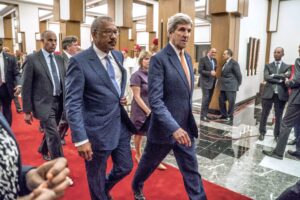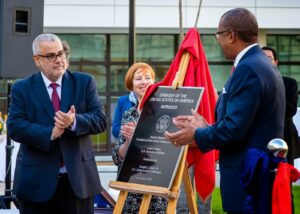This post was contributed by the Honorable Dwight L. Bush, former U.S. Ambassador to Morocco. It is a part of a blog series highlighting and acknowledging the work and contributions of Black diplomats during Black History Month.
I had always hoped that I would have the opportunity to do public service for our great country. Becoming an ambassador provided a perfect opportunity to serve. I am fortunate to have had broad academic, business and international philanthropic experiences which, taken as a whole, prepared me well for being an ambassador. I studied economics and government at Cornell University. Most of my career has been international finance and banking, and international philanthropic engagements with organizations like GAVI and CARE afforded me the opportunity to travel extensively (I have visited over 90 countries). I have interacted with executives at the highest levels. So, when President Barack Obama appointed me to be the U.S. Ambassador to Morocco, I felt well prepared.

I don’t feel that I faced many obstacles in my diplomatic assignment, as I had been prepared by my many life experiences along the way. My involvement on the board of GAVI and corporate and large not-for-profit organizations exposed me to high-level engagement and management. My travels around the world had helped me to understand the nuances of culture, language, decorum, protocol and history. More than anything else, I knew that to be successful at my post I needed to be as respectful of others as I would demand respect myself.
My tenure as ambassador was successful, as personified by the accolades that I received at the end of my assignment: King Mohammed VI of Morocco decorated me with the highest award that is given to non Moroccans, I was the first ambassador inducted into the U.S./Moroccan Chamber of Commerce, and I received the U.S. Department of State Distinctive Service Award.
I am most proud of the enduring impact that I had on the relationship between the United States and the people of Morocco. Through our outreach, use of technology and soft diplomacy, my colleagues and I were able to elevate the perception of the United States broadly: not just with the leaders of the Kingdom, but also with Moroccans across the country and with the Moroccan diaspora in the United States.

Being a diplomat confirmed that my personal values — respect, dignity, and belief in the worth of all persons — when put into practice, can result in positive outcomes. Simple kindness, listening, and trying to understand the other side can take you a long way in life and in diplomacy. My only regret from my experience as ambassador is that the clock ran out before we could accomplish more.
I think that the United States would benefit greatly from having more diverse foreign service officers, and I encourage many young people to consider careers in foreign service. In addition, I am active in organizations like American Council of Young Political Leaders, and I have also embraced organizations like Global Kids to encourage more young people to consider foreign service. I am hopeful that when these young people become aware of what foreign service has to offer that they will study history, languages and culture, and get on the path to becoming citizens of the world.
I am currently mentoring several mid-level foreign service officers. Many have felt disenfranchised over recent years. I am encouraging them to stay at the Department of State, mindful that the leadership of the Biden administration highly values foreign service and diplomacy as critical to our success and the standing of the U.S. around the world with both our partners and adversaries.















